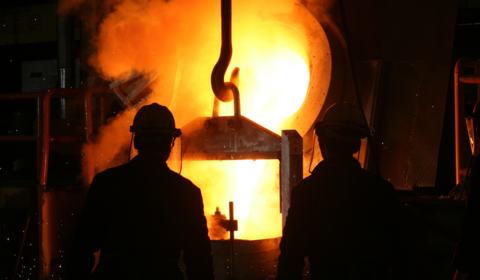
BUILDING A CLEAN FUTURE FOR SUSTAINABLE, SAFE AND EFFICIENT SMELTING
The rise of nickel smelting in Indonesia
Indonesia is the world's largest producer of nickel with over a quarter of the world's reserves. The country's nickel smelter industry has experienced rapid growth in recent years as it is driven by the increasing demand for nickel for use in stainless steel production, and more recently in electric vehicle batteries.
Exports of Indonesian nickel products were worth $30bn in 2022, more than ten times what they were in 2013. Nickel smelters have also sprouted around the country, and makers of electric vehicles batteries are already building factories. But the rapid pace of nickel smelter growth in Indonesia has exposed companies to technical and regulatory risks, and made compliance with environmental, social and corporate governance requirements extremely challenging.
However, the nickel smelter industry is also a major polluter and has faced scrutiny due to environmental concerns. The smelting process is energy-intensive and produces a range of pollutants, including sulphur dioxide, nitrogen oxides, and particulate matter. These pollutants can have a significant impact on air and water quality, as well as human health, contributing to environmental degradation and potential health risks for nearby communities.
Market outlook of nickel smelting and refining
The market outlook of the nickel smelter industry in Indonesia is constantly changing because it is driven by both internal and external factors such as environmental concerns, evolving regulations, technological advancements, and shifting market dynamics.
Historically, Indonesian nickel smelters are equipped to produce Class 2 nickel (ferronickel/pig iron) while battery cathode production requires Class 1 nickel that contains at least 99.8 percent nickel. While Indonesia is rich in laterite ore resources that are a good feedstock for Class 2 products used in steel production, it doesn’t have sulphide ore resources, which in general are a good fit for producing Class 1 nickel. However, laterite resources can be used as feedstock to produce intermediate products like mixed hydroxide precipitate (MHP) via hydrometallurgical processes such as High Pressure Acid Leach (HPAL). MHP can be further refined to Class 1 nickel. In a new development, MHP is also used directly to produce battery cathodes, skipping the step of refining Class 1 products, which allows better for an integrated supply chain from mine to cathode.
- Demand for Responsible Sourcing: International markets increasingly demand sustainably sourced and processed nickel. Sustainable practices in nickel smelting include reducing emissions, minimising water usage, and ensuring safe working conditions. These practices align with global trends towards responsible sourcing and environmental conservation.
- Technological Advances: The adoption of cleaner and more efficient smelting technologies has the potential to reduce the environmental footprint of nickel smelting operations. Innovation in smelting processes and equipment can contribute to sustainability goals.
- Market Access: Access to international markets for nickel products may increasingly depend on demonstrating sustainable and responsible practices. Smelters that can provide certification or assurance of sustainable production may have a competitive advantage in the global marketplace.
- Community and Stakeholder Engagement: Engaging with local communities and stakeholders has become essential for the industry's sustainability. Building positive relationships and addressing concerns related to environmental impact and social responsibility is crucial.
- Investor Expectations: Investors are increasingly considering environmental, social, and governance (ESG) factors when making investment decisions. Nickel smelters in Indonesia that align with ESG principles may find it easier to attract investment.
- Supply Chain Transparency: Transparency in the supply chain, from mining to smelting, is essential for sustainability. Demonstrating the provenance of nickel and ensuring it comes from responsible and ethical sources is a growing concern for consumers and businesses.
- Collaboration and Certification: Industry collaboration and the adoption of certification standards for responsible nickel production can help establish sustainability practices and build trust with stakeholders.
To promote sustainability in the nickel smelter industry, the government has taken several steps which include:
- Accelerated Nickel Ore Export Ban: In 2020, the Indonesian government accelerated the ban on the export of nickel ore in an effort to encourage domestic smelting and value-added processing. This policy aimed to boost the country's nickel processing capacity and reduce the environmental impact of exporting raw materials.
- Environmental Regulations: The government has introduced and enforced environmental regulations to curb pollution from the nickel smelting industry. This includes setting stricter emission standards and requirements for environmental impact assessments.
- Promotion of Sustainable Practices: The government has encouraged smelting companies to adopt sustainable and environmentally friendly technologies and practices such as dry stacking of tailings and the use of renewable energy sources through incentives and regulations. It is also investing in the development of sustainable nickel mining practices and establishing a nickel sustainability fund to support the development of new technologies and the remediation of polluted sites.
- Carbon Footprint Reduction: Nickel production in Indonesia is particularly carbon intensive — every ton of the metal-equivalent produced emits an average of 58.6 tons of carbon-dioxide-equivalent compared to the global average of 48 tons. Among plans to lower the carbon footprint in the industry is the construction of solar panels for as much power generation as possible, and the construction of hundreds of kilometers of pipes to pump slurry directly from mines to the smelters to reduce the use of trucks.
The nickel smelting industry should act now
The smelting industry in Indonesia has been taking various actions to improve sustainability in response to environmental concerns, regulatory changes, and market demands. While specific initiatives may vary, here are some common actions that need to be taken now to become more sustainable:
- Investment in Cleaner Technologies: Invest in modern and cleaner smelting technologies that are more energy-efficient and produce fewer emissions. These technologies can help reduce the environmental footprint of the smelting process.
- Emission Reduction: Implement measures to reduce emissions of sulphur dioxide (SO2) and other pollutants. This includes the installation of air pollution control equipment, such as scrubbers and baghouses, to capture and mitigate emissions.
- Environmental Impact Assessments (EIAs): Conducting comprehensive EIAs is a standard practice to evaluate and mitigate potential environmental impacts before starting or expanding smelting operations.
- Certifications and Standards: Pursue certifications and adhere to international sustainability standards, such as ISO 14001 (Environmental Management Systems), ISO 9001 (Quality Management Systems), ISO 26000 (Social Responsibility) and ISO 14064 (Carbon Footprint Verification – GHG) to demonstrate commitment to responsible and sustainable practices.
- Transparency: Work to increase transparency in the supply chains. This includes traceability of raw materials to ensure responsible sourcing of ores and minerals.
- Sustainability Reporting: Commission sustainability reports to provide stakeholders with information on the environmental and social performance. These reports often detail progress on sustainability initiatives and future goals.
- Training and Education: Providing training and education to employees and contractors on sustainable practices and safety measures is essential for improving overall performance.
- Compliance with Regulations: Complying with local and national environmental regulations is a fundamental aspect of sustainability. Smelting companies must adhere to emission limits and other regulatory requirements.
Your trusted partner for the nickel smelter industry
The outlook for sustainability in the nickel smelter industry in Indonesia is positive. Despite the rapid growth of the industry, the government has taken a series of steps to promote sustainability.
Although very demanding, the challenges faced can be overcome without having to compromise responsible and sustainable practices. What you require is a partner who is technically competent in mining and smelter operations, someone who understands the nuance of Indonesian regulations but is also experienced in the best global practices.
The partner you need is Bureau Veritas.
We are primed to play a vital role in supporting the sustainability of the nickel smelter industry in Indonesia. Through what we do, we ensure that smelters comply with environmental regulations by verifying that they are using sustainable practices and helping them to identify and reduce their environmental impact.
By working alongside our clients to develop and implement sustainable practices, we provide them with the assurance they need to demonstrate their commitment to sustainability to consumers and investors.
We are committed to helping the nickel smelter industry in Indonesia to achieve its sustainability goals. Together, we can help to make the nickel smelter industry in Indonesia more sustainable.
Country Chief Executive
Bureau Veritas Indonesia
With the increasing importance of nickel in energy transition, Indonesia is committed to building a sustainable nickel smelting industry and forge a responsible path forward to safeguard our environment.
